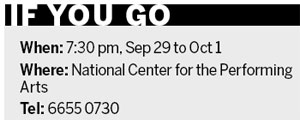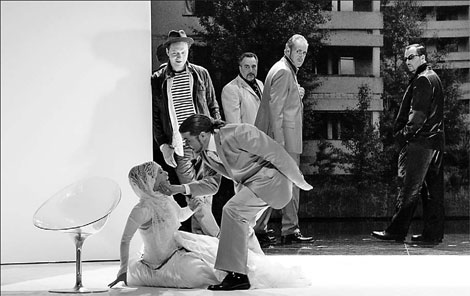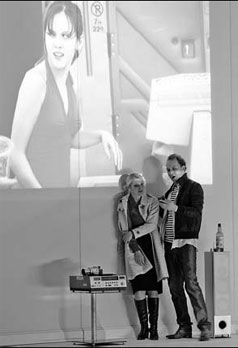Life and Leisure
Everywhere a Don Giovanni
By Chen Jie (China Daily)
Updated: 2010-09-17 07:49
 |
Large Medium Small |
|
A scene from Cologne Opera's latest production of Mozart's Don Giovanni. Photos Provided to China Daily |
Cologne Opera's latest production of the classic tale may have a modern feel but wrestles with the same old moral questions. Chen Jie reports
What wouldn't Don Giovanni, the young, arrogant, sexually prolific nobleman of yore, have done if he had access to the latest gizmo.
For one, he would have used it to brag about his sexual exploits, suggests Cologne Opera's latest production of Mozart's Don Giovanni.
The man, viewed in the West as the hero of the Enlightenment, slides an iPhone's screen, to reveal the faces of his 640 lovers in Italy, 231 in Germany, 100 in France, 91 in Turkey and 1,003 in Spain.
Each is projected on to a big screen and comes complete with a short video of his romps on the beach and in hotels.
Don Giovanni's motto "freedom lives" (in Chinese characters) appears prominently in some of the scenes.
This 21st century version of a story set in the mid-17th century, will be staged at the National Center for the Performing Arts.
|
The 21st century version of a story set in the mid-17th century makes a connection with contemporary life. |
Don Giovanni is often hailed abroad for standing up to the church and the rigid social conventions of his time. While Chinese audiences may not read as much political, social and philosophical meaning into it, Mozart's opera is a brilliant combination of stark human tragedy and touching comedy, set to great music.
Cologne Opera's Don Giovanni directed by Uwe Eric Laufenberg is an impressive production that makes a wonderful connection with contemporary life.
Laufenberg says he chose Don Giovanni as his first work, after taking over as artistic director of the Cologne Opera House last year, because it is "one of the most famous operas ever written, one of the most important of Mozart's operas".
He gathers a fantastic international cast including the British baritone Christopher Maltman in the title role, Russian bass Nikolai Didenko as Don Giovanni's servant, the German soprano Simone Kermes as Don Giovanni's lover Donna Anna, and Swedish soprano Maria Bengtsson as Donna Elvira who is abandoned by Don Giovanni.
Despite his innovative approach, the director keeps to the original's text and music, saying he wants to bring "the characters Mozart wanted to describe" to today's audiences.
"Mozart wants to tell his audience about a man who does not subscribe to any rules, who abuses and outrages everyone.
"But times have changed, and we had to find a way to tell today's audiences what Mozart really meant, what is dangerous in it, what is the fascination, and that is why we decided to use this modern approach," the director says.
"In Mozart's time, Don Giovanni was a nobleman but did not accept any rules, not of the church, not of morality, nor of the society he lived in. We can interpret this in the context of the current situation, because today when you have a lot money, and live a top-class life, you are more or less in a similar circumstance," says the director.

He says Don Giovanni lived a fancy life and he was fascinated with women. Men envied him and wanted to be like him. Don Giovanni's fascination is also true of our time, although the object of it may be different like entertainment, music, technology or the Internet, explains Laufenberg.
"Many people live the (obsessive) life that Don Giovanni led in his time. So for us, Don Giovanni is much more like a modern figure.
"It does raise the question of whether this is the right way to live. What do we really want? If everybody just follows what he or she wants, it could be very dangerous," he adds.

